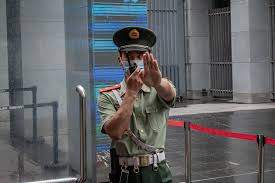U.S. Citizens in China Risk 'Arbitrary' Arrests and 'Exit Bans,' State Department Warns

The U.S. state department is urging citizens in China to exercise "increased caution" due to the risk of unprovoked or randomized arrests by police.
In an advisory published this weekend, coming amid an increasingly strained relationship between officials in Washington and Beijing, the agency warned about "arbitrary enforcement of local laws for purposes other than maintaining law and order."
The agency said enforcement could include arrests, detentions and "exit bans," which have previously been used to stop Americans from leaving the country and returning home, despite them not being formally detained or charged with a crime.
"U.S. citizens may be detained without access to U.S. consular services or information about their alleged crime," the agency said. "Citizens may be subjected to prolonged interrogations and extended detention for reasons related to 'state security.'Ads by scrollerads.com
"Security personnel may detain and/or deport U.S. citizens for sending private electronic messages critical of the PRC [People's Republic of China] government.
"If you are arrested or detained, ask police or prison officials to notify the U.S. Embassy or the nearest consulate immediately." According to Bloomberg, the warning was sent on Saturday morning U.S. time to citizens registered as being in China.
The warning comes amid a long-running trade dispute, with president Trump this week describing the relationship status with China as being "severely damaged."
"They could have stopped the plague. They could have stopped it. They didn't stop it," he told reporters onboard Air Force One Friday, referring to the COVID-19 pandemic that surfaced in the Chinese city of Wuhan before spreading globally, CNBC reported.
The president indicated the second phase of a U.S.-China trade deal was not currently a priority for his administration, saying there were other things on his mind.
As the coronavirus continues to ravage the United States, Trump has repeatedly referred to it as the "China virus" and complained China did not do enough to stop it.
"The world is now suffering as a result of the malfeasance of the Chinese government," the president said in a May 30 press conference. "China's cover-up of the Wuhan virus allowed the disease to spread all over the world, instigating a global pandemic that has cost more than 100,000 American lives and over a million lives worldwide."
Since then, infection and death rates have become even more dire, with statistics from Johns Hopkins University indicating COVID-19 has been linked to at least 134,815 U.S. deaths. It is still spreading rapidly in some states that took early steps to reopen.
Last month, the Financial Times reported that Chinese officials threatened "countermeasures" via trade deals after a joint statement by the U.S., Australia, Canada and the U.K. criticized a now-enacted national security law in Hong Kong.
Opposition quickly grew about the new law, which states that "secession, subversion, terrorism and collusion" are punishable by a maximum sentence of life in prison.
Photo: A Chinese paramilitary police officer gestures and speaks over his two-way radio whlie standing at the entrance gate of the Australian embassy in Beijing on July 9, 2020.NICOLAS ASFOURI/AFP/GETTY
Link: https://www.newsweek.com/state-department-china-warning-1517208




